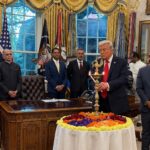The Office of the Executive Director for India and the Embassy of India in Washington, DC, jointly hosted Diwali celebrations at the World Bank headquarters, in partnership with the State Bank of India (SBI) and volunteers from the World Bank and International Monetary Fund (IMF) India Club.
The event brought together distinguished dignitaries, including Executive Director for India at the World Bank, Parameswaran Iyer, and his wife Indira Iyer; Executive Director for India at the IMF, Urjit Patel; Indian Ambassador to the United States, Vinay Kwatra, and his wife Pooja Kwatra; and President of the World Bank Group, Ajay Banga, among others.

Ambassador Kwatra highlighted the enduring collaboration between India and the World Bank.“India and the Bank have had a sterling partnership our entire development journey. You will find each milestone has a World Bank connect and a touch point to it,” he said, adding that it was an “absolutely proud moment” to see Ajay Banga take over the presidency of the Bank in 2023.
Ambassador Kwatra expressed his delight at seeing such a strong Indian presence within the World Bank community. “It’s absolutely delightful to see such a large community of Indians. I should say, in the World Bank and IMF — and ‘Indians’ is, by nature, an inclusive term: those who are from India, of Indian origin, connected to India, working on India, in love with India, not liking India — whichever way, in a way you are connected to India,” he said, encouraging all to embrace the spirit of the festival.
Executive Director Iyer emphasized how Diwali has transcended borders to become a global festival of light and learning. “Diwali has transcended India’s borders. It’s now a truly global celebration of what we like to say – light over darkness and knowledge over ignorance,” he said, noting that twelve countries around the world, in addition to India, have declared national holidays for Diwali.
He linked the festival’s message of light and knowledge to the World Bank’s mission. The Bank’s vision is to foster knowledge and partnerships across the globe, complementing investments with tangible, on-the-ground impact that creates jobs and opportunities, Iyer said, while commending the volunteers of the Bank and Fund India Club for organizing the event with support from SBI.

Executive Director Patel, who recently began his new role as India’s Executive Director at the IMF, said the festival’s timing was especially significant.
“It’s a joy to celebrate Diwali with all of you. This Diwali is particularly pertinent for me as I begin a new assignment as India’s Executive Director at the IMF, representing the constituency comprising Bhutan, Sri Lanka, Bangladesh, and India,” he said, describing it as an honor to represent a region whose story continues to inspire the world with “resilience, reform, and renewal.”
Reflecting on Diwali’s economic symbolism, Patel added, “As an economist, I see Diwali’s message reflected in our journey of balancing growth with prudence, ambition with inclusion.”
He also noted that the season marks a new year in parts of India, “a time we close old ledgers, open new ones, and begin again with gratitude and clarity — especially for businesses and hopefully for creating jobs,” echoing themes from President Banga’s recent remarks on employment.
In his address, Banga offered a personal interpretation of Diwali’s meaning. “Diwali to me means three things. It’s first about light over darkness. It is second, about knowledge over ignorance, because ignorance, to me, is a real big issue in our world. And the third is that it’s about hope over despair,” he said.
Banga connected Diwali’s themes to the Bank’s focus on job creation. “In the last few weeks, we have talked a lot about jobs,” he said.
“The connection to jobs is actually the connection to hope. Young people must have hope, optimism, and the right to a good life. Giving them that hope, giving them that optimism, giving them that sign of looking forward to a future that everyone should be proud of — that to me, is what things like Diwali mean.”
He urged attendees to think of Diwali as both a personal and collective reflection. “Diwali is not just a personal festival. Diwali is a way to think about the year ahead of you, and a way to think about dedicating your own mind to being who you want to be,” Banga said.
“What I want to be is the person who feels that young people think we give them a chance, and that’s all that this jobs thing is about.”
The most effective way to eliminate poverty is by creating employment. Yet, empowering individuals to overcome poverty also requires giving them hope. Poverty is both a condition and a mindset – while financial resources can address the former, only hope can transform the latter.
“So when you think of Diwali, think of hope, and think of optimism and think of the future, and think of light and think of knowledge and think of those things. That’s what Diwali means,” he added.






